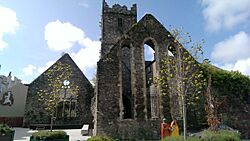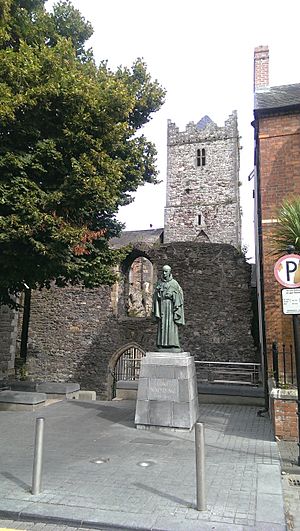French Church, Waterford facts for kids

French Church, Waterford
|
|
| Lua error in Module:Location_map at line 420: attempt to index field 'wikibase' (a nil value). | |
| Monastery information | |
|---|---|
| Order | Franciscans |
| Established | 1241 |
| Disestablished | 1541 |
| Architecture | |
| Status | Inactive |
| Site | |
| Public access | Yes |
| Official name | The French Church (Waterford) |
| Reference no. | 205 |
The French Church, also known as Greyfriars Abbey, is a very old building in Waterford, Ireland. It was once a Franciscan friary, which is a type of monastery where monks lived. This friary was built way back in 1241. You can find it where Greyfriars and Baileys New Street are today.
Right at the entrance to this historic church, there's a statue. It honors Luke Wadding, who was a priest born in Waterford in the 1600s. The French Church was one of the first friaries ever built in Ireland. It was started by an Anglo-Norman knight named Sir Hugh Purcell.
Contents
King Richard II's Visit
In 1394, Richard II, who was the King of England, stayed at the church. He was planning his attacks against the Irish clans in the Wicklow Mountains. It's also said that in 1395, four important Irish clan chiefs gave up to King Richard II here. This happened during one of his two trips to Ireland. These chiefs included the O'Conor Don, de Burgo, O'Brien, and O'Kennedy families.
Later, in the late 1400s, a tall bell tower was added to the church. This tower is 25 meters high and you can still see it today. The bells from this tower were sold in 1541 by King Henry VIII. People believe these bells are now in Christchurch Cathedral, which is nearby. The wooden frame that held the bells stayed at the site until 1809.
From Friary to Almshouse
The friary was closed down in April 1541 by King Henry VIII. This was part of a big event called the dissolution of the monasteries. Even though the friary was closed, the Franciscan monks were allowed to stay in Waterford. In 1544, King Henry VIII gave permission to turn part of the building into a hospital or an almshouse. An almshouse was a place that offered shelter and care to poor people.
Why it's Called the French Church
In the 1600s, a part of the church, called the choir, was changed. Bishop Nathaniel Foy made it ready for use by Huguenots. Huguenots were French Protestants who had to leave France. They were invited to Waterford to work in the linen industry. Because these French people used the church, it became known as the "French Church."
Who is Buried Here?

The graveyard around the French Church is a final resting place for many people. One important person buried here is Sir Hugh Purcell. He was the knight who founded the church around 1250. His grave is near the main altar.
Another person buried here is Lord Richard Poer, who died in 1607. He was a strong supporter of the Catholic faith. His wife, Catherine de Barry, is also buried beside him. Sir Nicholas Walsh, who was a chief judge in the kingdom, was buried here in 1615. John Roberts, a famous architect who lived from 1712 to 1796, is also buried in this historic graveyard.
See also
 | Kyle Baker |
 | Joseph Yoakum |
 | Laura Wheeler Waring |
 | Henry Ossawa Tanner |

